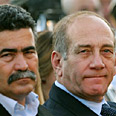
No need for a general
We need experienced leaders, but not necessarily former generals
As in the past, even the interim report by the Winograd Commission has already sprouted biased and erroneous interpretations.
The harsh criticism the report leveled at the prime minister's and defense minister's lack of defense, military and political experience seems to suggest that from now on only former generals would be suitable to serve as prime ministers and defense ministers in Israel. An Italian weekly that sought to interview me about the commission's report phrased this more harshly: "Does this mean the return of the generals?"
The answer is of course no.
An examination of the make-up of Israel's governments to date shows that all of them, whether leftist or rightist, possessed defense, military or political experience. Key posts were not necessarily manned by former generals – and clearly even persons with vast experience are likely to err (see the Yom Kippur War).
However, the fact is that before Olmert-Peretz cabinet there had never been an Israeli government whose two key leaders lacked defense, military and political experience.
Notably, there were former defense ministers in Israel who were not former generals – Shimon Peres and Moshe Arens – yet they had extensive military background. Yitzhak Shamir had such experience (which proved itself during the First Gulf War); Menachem Begin lacked such experience and therefore he surrounded himself with experienced people the likes of Moshe Dayan and Ezer Weizman.
The Yom Kippur War makes it difficult to say positive things about Golda Meir in this context; however, her political experience served her well in navigating Israel's political path; even those who disputed her views must recognize this.
Experience means that the political leader can make value judgments pertaining to the proposed options made by the military echelons – otherwise he would become captive to the military's stance. Moreover, those lacking experience do not know how to ask the important and difficult questions - questions everyone deciding to embark on war should know how to ask.
Because the team Olmert-Peretz didn't ask these questions, Israel found itself embroiled in a war whose leadership clearly didn't want, didn't predict and wasn't prepared for.
From the excerpts of testimonies made public, it appears that Shimon Peres was the only one who asked the fundamental questions - and they remained unanswered, among other things because the prime minister and the defense minister thought they were not important enough.
The list of candidates for the post of prime minister and defense minister in the near future is not long, yet the question of experience is crucial. It's not enough to speak eloquently and to verbally convince others in the primaries; those who have never been ministers would do well not to jump into the post of defense minister or to aspire for the prime minister's chair.
Nobody has a monopoly over wisdom and intelligence – and the generals (and admirals) cannot monopolize the understanding of defense and political issues. But as it wouldn’t occur to anyone to appoint a finance minister without a financial background, we should hope that never again in Israel will a prime minister or a defense minister be appointed without the necessary defense experience or without first serving as a minister.










